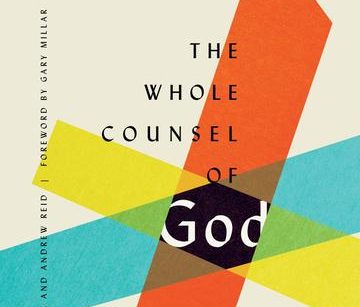Review: The Whole Counsel of God – Why and How to Preach the Entire Bible


Few evangelicals today will question the importance of expository preaching. What is less clear, however, is our commitment to preach the whole Bible—every verse, every chapter and every book.
In The Whole Counsel of God, Tim Patrick and Andrew Reid convincingly argue that it is not enough for us to merely preach from the Bible. We must preach the whole Bible as God has revealed it. This book is unique in that it steps back from the individual expository sermon and evaluates our preaching practice at a much higher level. It advocates preaching that is expository and seriatim; that is, sequential through whole books of the Bible. Drawing from their experience as pastor-preacher-theologians, Patrick and Reid lay down a challenge that if taken up, would reform the preacher’s mandate: “All vocational preachers should set themselves the goal of preaching through the entire Bible over a thirty-five-year period” (81). There’s no doubt that the authors set a high bar. What follows is a biblically thoughtful and practically helpful guide for preachers to meet that challenge with confidence.
The book is divided into three parts and moves from the why to the how of preaching the whole Bible. Part 1 builds a theological foundation for whole Bible preaching and grounds it in the Bible’s canonical unity. In Part 2, the authors provide a how-to guide for preaching the whole Bible as “a complex and unified book” (88) centred on the gospel of Christ. Chapters 6–8 form the practical guts of the book and step readers through the process of systematically planning to preach the whole Bible. These chapters contain useful diagrams and preaching calendars that can be easily adapted by readers to their own contexts. Particularly helpful are charts that divide the biblical books into six preachable categories. In contrast to many popular divisions, these categories are canonically well-proportioned: two-thirds Old Testament, one-third New Testament. The book ends with a series of practical and pastoral considerations that ground the project of whole Bible preaching in the local church.
A challenge to the committed expository preacher
Throughout the book, Patrick and Reid demonstrate that a commitment to expository preaching unfortunately does not guarantee a commitment to whole Bible preaching. In Chapter 3, they illustrate a variety of ways in which even a committed expository preacher might fail in this task.
- Just think of the preacher who delivers faithful expositions, but from different a part of the Bible each week.
- Or the sermon series that faithfully preaches only part of a book but never actually completes it (e.g. Romans 1–8 but not 9–16, Daniel 1–6 but not 7–12, or Revelation 2–3 but not any other part of the letter).
- Or, zooming out, think of the many pastors who might preach through whole books of the Bible but only those books with which they are familiar. What then results is a disproportionate representation of sermon series through New Testament epistles often at the expense of Old Testament prophets.
The authors also caution against preaching “overview series” or “highlights packages” which summarise large swaths of law or narrative in just a handful of sample texts. Think of a four-week series through Genesis 12–50 with sermons devoted to the lives of Abraham, Isaac, Jacob and Joseph.
Underlying the authors’ critique is a principled conviction that the fundamental units of revelation are the 66 books of the canon and the whole Bible as one unified text. The above examples of “patchwork” expository preaching may be faithful to our individually selected passage but not the books of the Bible “as they were written and intended to be read” (28). It is not enough that our sermons are expository at the level of chapter and verse, they must be expository at the level of biblical books and the Bible as one book. The patchwork expository preacher fails not in his weekly preaching but in his long-range planning of what to preach. Patrick and Reid challenge us to plan not just weeks or months but even years in advance to preach a balanced diet of the whole Bible as God intended.
It’s curious that the failings of patchwork expository preaching identified in this book are the very same critiques we might make of topical preaching: decontextualisation and disproportion. Our failings, however, may not be in how we preach the individual passage but in what passages we plan to preach. Ironically, the committed expository preacher may be guilty of the very same sins of the topical preacher but merely at a higher level.
Chapter 3 is a valuable diagnostic which every preacher should use to evaluate their practice. Even the most committed expository preacher will find himself challenged and maybe even gently rebuked.
A challenge for the long-term preacher
While Patrick and Reid address their challenge to “all vocational preachers,” there is a tacit sense in which they are primarily addressing the long-term primary preacher of a single church. Readers not in this position may feel slightly disadvantaged in engaging their challenge.
The benefits of whole-Bible preaching advocated in this book seem to depend on the long-term commitment of a single preacher to a single church. After all, there is limited value in a pastor successfully preaching the whole Bible over 35 years but moving so frequently that no single church ever receives the full benefit of his ministry. The authors acknowledge that “for the congregation, the theological consistency afforded by having the same pastor preach to them over an extended period of time is immeasurable” (218). However, the average tenure of a pastor in Australia is a mere 3–5 years, in which case the project of whole Bible preaching may seem unrealistic. If the challenge of this book is to be successfully met (as I hope it will be) and its benefits fully enjoyed by the church (as they must be), pastors must commit to longer-term preaching ministries in the one location. An even more “audacious” and “outrageous” challenge would be to preach through the entire Bible over a 35 year period at the one church.
The authors understandably do not go this far and recognise that this long-term ideal is not always possible. Even if the preacher stays for 35 years, his people might not. Both authors have pastored undergraduate university churches with a three-year congregational turnover. In that context, they wisely commend a long-term orientation that preaches a balanced diet of biblical books but over a three-year horizon. Nevertheless, it seems that the benefits of whole Bible preaching can be undermined by serially short-term preaching ministries.
All this suggests that the challenge of this book should be taken up not only by preachers but churches. After all, preaching the whole Bible is not a badge of the preacher’s self-achievement but a means of the church’s maturity—“our goal in preaching is to serve, not to impress.” (235) The point of the challenge is not that the pastor successfully preaches the whole Bible but that the church hears the whole Bible preached. Indeed, unless the pastor commits 35 years to the one church, it is the church who must commit itself to the continued exposition of the whole Bible whoever occupies its pulpit.
A challenge too great?
Some might wonder whether Patrick and Reid set the bar too high. I do not think they do. The standard of preaching they call for is no higher and definitely no lower than what the nature of the Bible demands. Whether or not readers take up their challenge in its totality, this book will equip them to preach the Bible as it was always meant to be preached.
This book is a must-read for all preachers at every level, and should be placed in the hands of every seminary graduate. With clarity, ambition and foresight, it sets the agenda for a lifetime of preaching so that God’s people might hear not just some but all of his word. Even older preachers who may not have the years to complete this challenge will benefit from starting it and passing it onto their successors.
I intend to take up this challenge and pray that many other preachers will do the same. May it be that when we each approach the end of our preaching years, we can all join the Apostle Paul in confessing to our churches, “I did not shrink from declaring to you the whole counsel of God” (Acts 20:27).
Get articles delivered straight to your inbox. Sign up for our mailing list here.
Follow us on:

Adam Ch’ng is the pastor of Cross & Crown, an FIEC church in the south-eastern suburbs of Melbourne. He is committed to cross-cultural ministry in Australia and South-East Asia, and serves on the committees of TGCA (Vic) and TGCA (Asia). Adam studied Arts/Laws at Monash University and theology at Ridley College. Prior to entering gospel ministry, he worked as a lawyer and ministerial adviser to the Abbott Government.
Related Articles
The Extension of Eden: From Promised Land to New Creation

The question of the promises regarding the land of Israel has always been a vexed one, arising afresh in the modern day conflict between Israel & Palestine. How does biblical theology help us in thinking rightly about the Promised Land? In this, article, we consider the Bible's teaching from Genesis to Revelation and it's implications for how we think about the Promised Land today.
Gospel Centrality: What are we really talking about?

“Gospel-centred”. Perhaps you’ve heard that phrase thrown around in the last few years! Indeed, it’s language I myself have adopted, as I’ve exhorted my congregation. “Live a gospel-centred life!” “Let’s be a gospel-centred church!” But what do I mean by that? That’s something I’ve been pondering for a while now. After all, if I’m not clear what I mean...
Biblical Theology of Race

Although Christians are familiar with the Biblical injunction that faith in Jesus Christ means, among other things, the rejection of racism (e.g., Gal. 3:28; Eph. 2:14), the history of Christianity leaves much to be desired of. The Holy Writ was abused by Nazi Germany to espouse anti-Semitism and the promotion of the Aryan master race...
